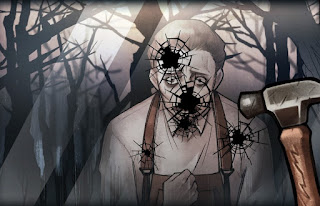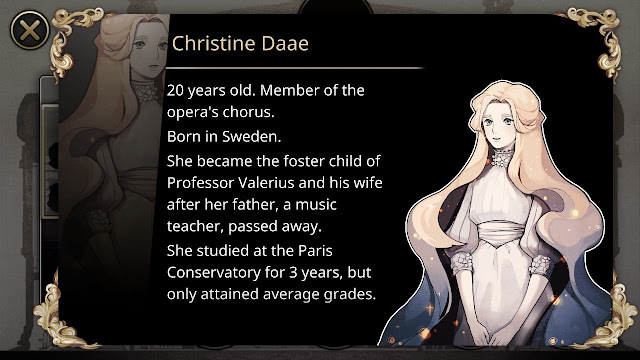The Phantom of the Opera is one of my favourite books. Before it became most famous for an Andrew Lloyd Webber musical, it was a masterfully written bit of gothic literature, right up there with the likes of Dracula, Wuthering Heights, Frankenstein, and The Monk. Unfortunately, the musical, though very watchable and far more tolerable than many of Webber’s other projects, has since come to dominate people’s understanding of the story, and that’s disappointing, because the narrative is better than what the musical offers. MazM is a developer that is committed to taking classic literature and turning it into video games. The team has previously tackled Wizard of Oz and Dr. Jekyll and Mr. Hyde (though unfortunately neither of those is available on Switch). The Phantom of the Opera is the first from this developer that I’ve played and, while I don’t think it’s great, I would like to see MazM continue, because we badly need more developers that can look at literature like this, rather than yet more damn Tom Clancy or Youth Fantasy authors.
Structurally, The Phantom of the Opera is a point-and-click adventure game, but without the elaborate puzzles. Effectively this means that the game offers a fairly straightforward, almost visual novel-like approach to the story, and it does stick quite nicely to the book’s key moments. The added benefit of the interactive medium is that the developers can take a swing at filling in the blanks of the book. So, rather than just seeing Joseph Buquet show up dead, as he appears in the book (and I’m really sorry if that’s a spoiler to you, but we’re talking about a 100-year-old book here, so just deal with it), we can instead see the circumstances and terror with which his death played out.
While it’s good in the sense that it gives the developers creative freedom to go beyond the book, there are also issues with it. Firstly, the video game industry has never been good at understanding that sometimes less is more, but quality authors certainly do, so by adding scenes for “clarity”, the developer is undermining the creative vision of the author to an extent. That’s perfectly normal for any adaptation or reworking of a work, but The Phantom of the Opera was never really about grisly horror scenes, and the way that Buquet goes in this game is a significant break from what, I believe Gaston Leroux would have envisioned as he was writing.
The other big issue is the pacing. The Phantom of the Opera is notable for a certain structural beauty, with words flowing off the page with a musical rhythm and tone. It’s not quite poetic, but it was very carefully crafted. Naturally, a video game needs to present the narrative differently – there are characters to move around, and interactivity to consider. The developers have gone with something of an abridged script to help ensure that the game doesn’t get bogged down to the length that a novel would, but the tone and timbre of the words and rhythm are just not there. In other words, they’ve captured the story of The Phantom of the Opera, but missed the mark on the narrative and spirit.
It doesn’t help that it’s a technical mess to deal with. Originally built for touchscreen phones and PCs and their mice, actually navigating around The Phantom of the Opera’s menu and UI system is a clunky pain when you’re playing it on the TV with the Switch’s docked mode. More than a few times I couldn’t figure out why I couldn’t talk to a certain character that I was standing right in front of, only to realise that I had a UI element “highlighted” first, and I needed to exit that before I could start a conversation or investigate something. After every “cut scene” (and there are a lot, as this is a visual novel of sorts), there’s a solid two to five seconds where the screen “freezes” before finally kicking back into action and giving you control. The first couple of times I experienced that I thought the game was crashing, and there’s no good reason for any of that sort to occur in The Phantom of the Opera, because the game isn’t really going to challenge any piece of hardware out there. Finally, every so often as you’ll play you’ll encounter minigames, and these things are… not very well designed. They’re always functional, but clearly put in there more out of a sense of obligation for making this a “game” than for any compelling reason to use gameplay to enhance the experience.
What I did like, a great deal, is the art. The Phantom of the Opera plays in some pretty “high art” places. It’s set in an opera house, after all. Most of the major characters are either singers or ballet dancers. The “underworld” where this despicable phantom resides, is terrifying as much because it’s dirty than anything else. Leroux wasn’t being subversive or critical in his depiction of this world, as such, but rather wanted it to be an exotic setting for a fantastic story within the heart of Paris itself. The game builds on all of this with a simple, but elegant and beautifully minimalist art style, and some gorgeous character portraits.









